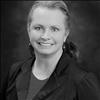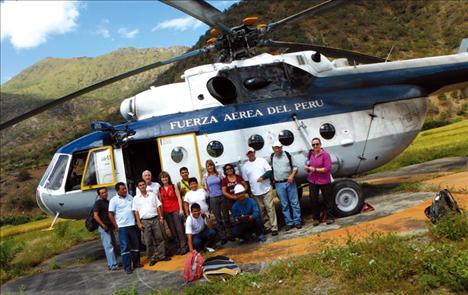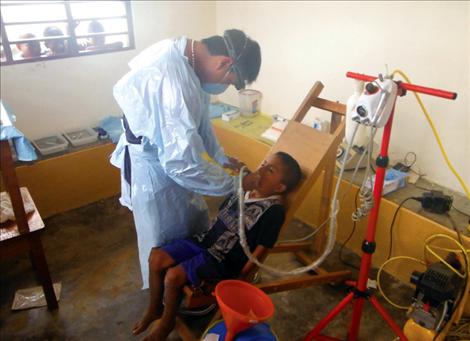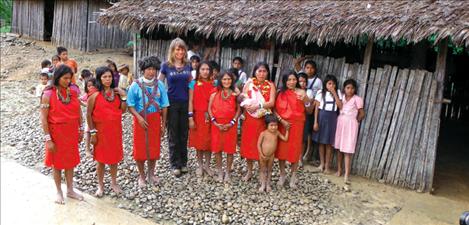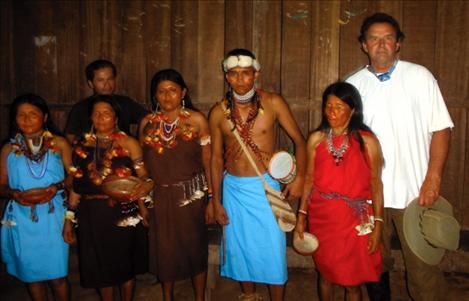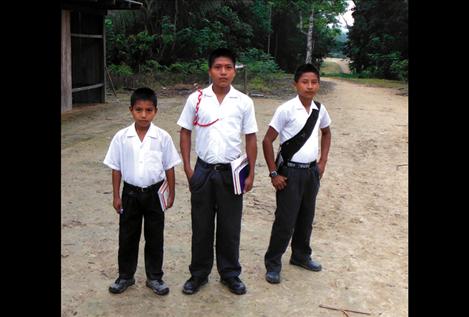Amazon trip promises and delivers for Polson man
Hey savvy news reader! Thanks for choosing local.
You are now reading
1 of 3 free articles.
More than a plane ride, a helicopter jaunt and a six-hour bus ride separate the upper Amazon Basin in northeast Peru from Polson.
Polson attorney Tom Kragh said on a 1-to-10 scale of remoteness, villages there are an 8.
But villagers are in touch with the outside world through shortwave radio towers and stylish clothes. Each of the four villages Krage visited had a school, the nicest building in the village, and a soccer field. But they don’t have doctors and dentists.
In search of a challenge and “travel with a purpose,” Kragh went on an Amazon Promise trip to the area in May. Amazon Promise is a U.S.-based, nonprofit organization founded in 1993 to provide desperately needed medical and dental care to remote populations in Peru. Amazon Promise’s Patty Webster was the team leader and dealt with logistics.
Without the help of PetroPeru, a Peruvian oil company, Kragh said visiting the remote villages wouldn’t have been possible. PetroPeru housed the 13-member group in dormitories and fed them breakfast, lunch and dinner. Then the oil company’s helicopters dropped Kragh’s group after a 20-minute flight that would have taken them two days by boat.
The first village they visited was Avajun.
“The whole village swarmed us,” Kragh remembered, “and hauled the supplies in.”
Each Amazon Promise member also toted in 20 liters of water for their own use.
The chief and villagers welcomed the group and painted the visitors’ faces red. To honor their guests, the Peruvians dressed in their finest, which included lots of parrot feathers, danced and feasted, using big palm leaves for bowls. They even cooked up a stack of grubs.
“I ate one,” Kragh said, grinning. “It was crunchy.”
The village itself was set in a clearing in the jungle.
“I didn’t know what to expect,” Kragh said. “I’d never been in the jungle.”
The jungle was dense and discombobulating, Kragh said. If a person walked 30 feet into the forest, he or she could be lost, because it’s disorienting.
“You can’t look up and see the sky,” he explained.
The villagers do go into the jungle to hunt, but they have to travel quite a way since all the game close to the villages has been harvested.
The clinics Amazon Promise set up had a registration table, where each patient was routinely given an anti-parasitic pill. The Peruvian government provided the drugs. Four doctors were along on Kragh’s trip, and they divided up the patients. If there was a dental issue, the patient was sent on to the dentist.
Kragh’s job was dental assistant to a rookie dentist named Carlos. In Peru, dental students go directly from high school to a six-year dental program. The sixth year of the dental school is dedicated to community service, and Amazon Promise was Carlos’ community service.
Kragh said he sterilized instruments with bleach, loaded syringes and laid out the clean instruments.
Gowned up and gloved, with a drill running, a patient in the chair and a line waiting, Kragh and Carlos drew a crowd wherever they went. Children and adults would peek in the windows and doors to watch the proceedings.
“We almost felt we were rock stars,” Kragh said.
The two men saw about 50 to 60 people per day with every other person an extraction. Carlos didn’t do restorative dentistry, just
fillings and extractions.
Kragh characterized the villagers as “the toughest people I’ve ever seen, getting fillings and extractions with no deadening. Those people just sat there and took it, a child, a man or a woman.”
Kragh and Carlos gave out toothbrushes and toothpaste, although the villagers weren’t sure how to use them.
“They didn’t equate good oral health with good overall health,” Kragh said.
With diet high in carbohydrates, since they grow crops like rice, bananas and corn, the villagers have bad teeth, so Amazon Promise is teaching them about good oral health.
The group’s hardworking cook, Luisa, rose every morning at 4:30 a.m. and cooked over an open fire. The Amazon Promise team brought in its own food and ate lots of rice and beans.
Kragh slept in a one-person tent in a sleeping bag with his duffle as a pillow. The group saw about 800 patients in the four villages, so they worked hard. The weather was hot and humid, and nightlife was a quick dip in the water to cool off. With no electric lights, the stars were beautiful, Kragh said, and he saw the Southern Cross.
Kragh would go again, he said. Members of the team were such remarkable individuals, like Webster, who was a finalist for CNN’s heroes of the year, and doctors Dan and Lindsay McDougal from Seattle, retired physicians who come to help.
The Peruvian villagers were not envious of the Americans. They have a good life, and they’re so appreciative of the medical and dental care, Kragh noted.
“It was life-changing for me,” Kragh said.



